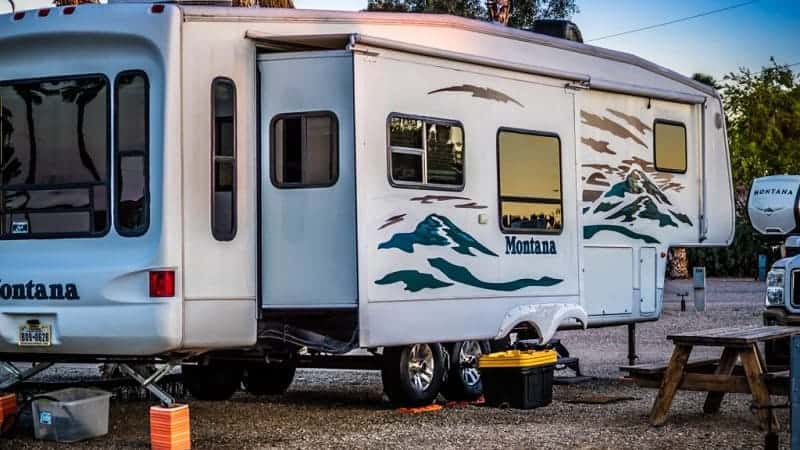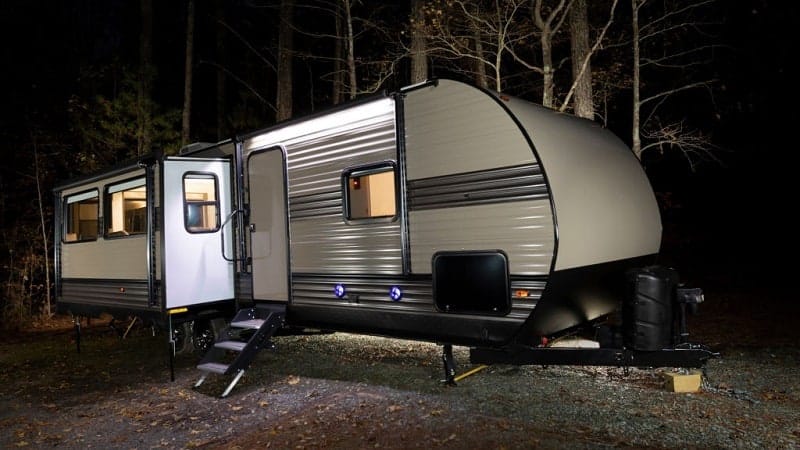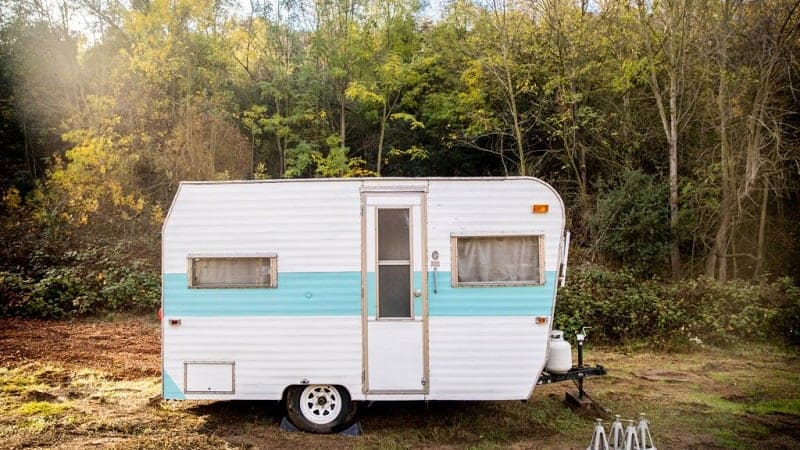If you are planning to invest in a new motorhome this season, or an overhaul of your existing truck, you should pay special attention to sidings. The question here is which one is the better option? To make your decision easier, we have conducted thorough research on RV sidings and created this RV aluminum siding vs fiberglass analysis with advantages and disadvantages.
Table of Contents
Aluminum Sidings
First, we will take you through the traditional aluminum sidings, which have held together RVs for decades now. Before this, they were built with steel, which wasn’t lightweight enough. It was only after 1936 when Airstream started using aluminum for trailers that the RV industry was revolutionized.
Steel sidings, although the beginning of the RV industry, did not last much once manufacturers started using aluminum because:
- They made trailers heavy and cumbersome, totally out of functionality and convenience that modern-day campers are looking for.
- Steel tends to rust and corrode, requiring the manufacturer to spend a lot of time and effort in treating and painting the RV. This leads to a rise in the manufacturing cost, and ultimately the RVs became expensive.
The advantages of using aluminum outnumber those of the steel material. For starters, aluminum is more convenient to work with as it is more malleable and can be molded to take form without much work. Hence, the RV makers are now able to give their products more rounded shapes. The iconic Airstream Fuselage is the perfect example of this advanced craftsmanship.
Another advantage of aluminum over steel is its resistance to rust, allowing owners to go without much expenditure on paint jobs for years. Also, the manufacturing process becomes easier, with little requirement for treatment to prevent rusting. As manufacturing involves less effort, it is cheaper too.
An obvious benefit of using aluminum is that it tends to be ultra-lightweight, without compromising on strength compared to steel.
Pros of Using Aluminum Sidings
- Reduced Cost of Production
Since aluminum is more malleable, moldable, and economically viable, it is easier for manufacturers to work. In this way, the manufacturing cost subsides drastically, allowing you to buy an RV with more amenities than before.
- Trusted Technology
While fiberglass RVs have just hit the markets, aluminum RVs have been around for decades now. You can only imagine how manufacturers have perfected their workmanship with this material by now. Therefore, you can expect flawless engineering in the form of aluminum RVs.
- No Need to Deal with Delamination
Aluminum is one of those undefeatable materials which can resist weather like no other. Have you ever heard of aluminum delaminating? We believe not because it doesn’t delaminate.
Delamination occurs when the outside layer of any material, due to the atmospheric changes, separates from the layers beneath it, creating unsightly bubbles. This can be the cause of moisture seeping inside your trailer walls and affecting your fixtures and fittings.
Thankfully, there are aluminum RVs which will save you the expenditure.
- Easy and Cheap Repairs
RVs, like other vehicles, are prone to bumping into other vehicles and develop dents. While getting a fiberglass RV repaired could have burnt a hole in your pockets, aluminum repairs are way cheaper. Indeed, aluminum panels can be easily replaced or molded to look like nothing happened, saving you a fortune.
Let us also clarify here that only the corrugated aluminum proves cost-effective. In case you have a smooth aluminum vehicle, you will have to get a larger panel replaced, costing you more.
Fiberglass
Now that you know more about what makes aluminum an ideal choice, it would be only fair to take you through fiberglass technology and the way it has taken over the market by storm.
Fiberglass is a new material, made up of a combination of plastic and glass fiber. It became an instant hit in the market due to its incredible weight-to-strength ratio, moldability, and non-conductivity. The Canadian RV company Boler started the fiberglass revolution by manufacturing the first-ever RV with it in the 1960s. However, the technology did not catch on until recently.
Advantages of Using Fiberglass Technology
- Higher Resale Value
As discussed earlier, fiberglass is a recent trend and is a promising one. As a result, more individuals are ready to invest in fiberglass RVs rather than aluminum ones, keeping the resale value of the former high for years to come.
As an investment, fiberglass RVs hold the ground.
- Maintenance
Good-quality fiberglass does not require much maintenance and is easier to clean as compared to aluminum sidings.
- Doesn’t Develop Dents Easily
As discussed earlier, it can be an expensive ordeal to get the dents in a fiberglass RV fixed. Then again, this does not mean that you should not invest in one altogether because fiberglass RVs are less prone to developing dents due to minor collisions.
Apart from dents, since fiberglass does not require putty to stick together, there are fewer chances of water seeping into your trailer due to leakages as well.
- Superior Construction
The ease of molding the fiberglass allows the manufacturers to go wild with construction and create aerodynamic wonders with a smooth finish. A better mpg due to good aerodynamics can save you gallons of gas if you drive for miles in your RV.
On the other hand, aluminum constructions can be bumpy and corrugated, rendering the mileage less appealing in the longer run.
- Modern and Stylish
No matter what, once cannot possibly ignore the aesthetic advantage of owning a fiberglass RV rather than an aluminum one. They do not require sealants visible at joints, do not have wires that run on the exterior of the wall, and are not prone to hail damage. All of these advantages save you from the embarrassment of having a shabby looking trailer.
The new and stunningly designed fiberglass RVs are more desirable, and their appearance makes them an investment you will cherish.
As you know, everything is not hunky-dory with fiberglass RVs because:
- Even the slightest leaks can cause delamination. So, before buying one, ensure that you inspect the inner glasses too. The areas near corners and under windows are more vulnerable to water damages, requiring special attention. It is not only water, but poor quality glue between Luan wood and fiberglass panels can also cause delamination.
Repairs of delaminated RV sidings can be expensive, so you have to be a careful buyer before you invest in one.
While fiberglass doesn’t develop dents easily if anything strikes against the fiberglass, visible spiderweb cracks are formed. Moreover, you will be surprised to see how prominent the scrape marks on the fiberglass surface can be. Such things can ruin the appearance and resale value of your vehicle.
- Since there is little provision for wires on the exterior of the truck, you can have trouble setting up satellite cables, forcing you to watch the game in a local pub instead.
Fiberglass RV siding has many advantages, but it can also oxidize if not cleaned and maintained properly. If your fiberglass RV is oxidizing, read this article of mine. Besides, we’ve also compiled a list of the top-rated RV wax for fiberglass for you to choose from.
Conclusion
As we have discussed all the positive and negative aspects of both materials, we have concluded that it is up to you to decide what you want to deal with.
- If you have a hefty budget and can bear the cost of expensive repairs if an accident occurs in the future, you can opt for fiberglass RVs.
- Shell out your money on a fiberglass RV if you want better resale value from the van in the near future.
- As far as the weight of both materials is concerned, there is a negligible difference between the two so you can overlook that.
- Finally, introspect to discover what works best for you, whether aesthetics and design or durability and cost-effectiveness. Once you know what will please you more, you will make the right decision.

Hi, I am Tom Hank, an RV-er since 2014. Back then, I started without much help. As you can imagine, the struggles are endless. But now, you do not have to begin your adventures knowing next to nothing about RV lives.





